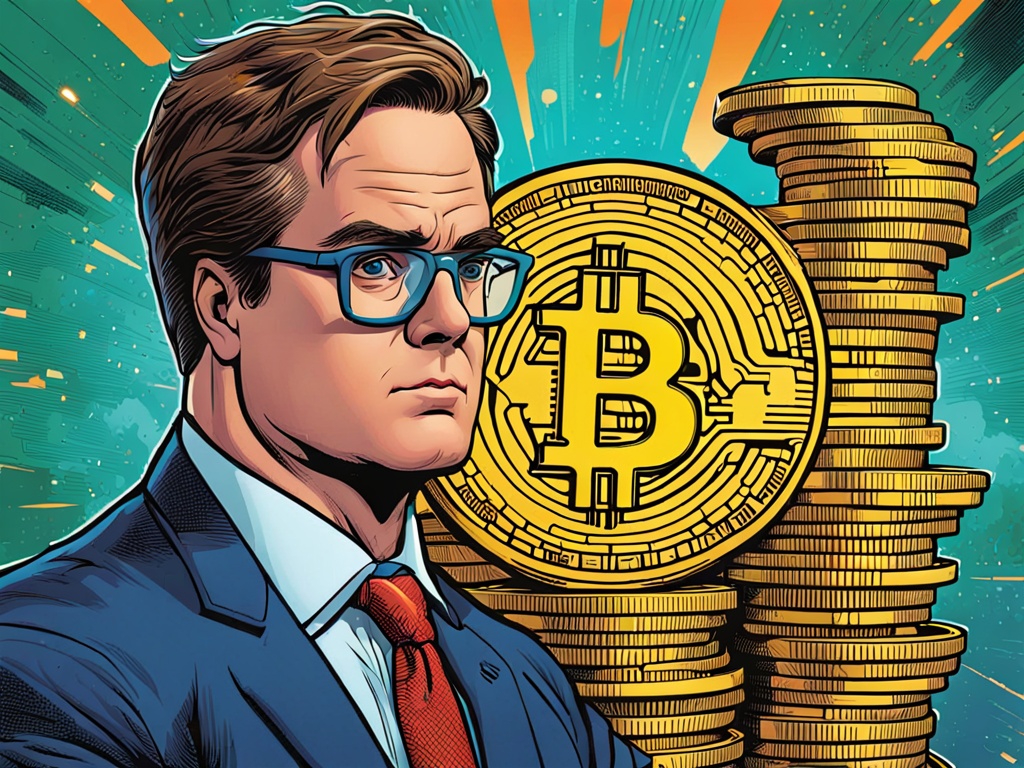The Day BlackRock Tried to Sell Us Bitcoin Dreams — But Left Us Wondering if They’re Nightmare Fuel
So here’s the scene: you’re sitting at a coffee shop, scrolling through Twitter, and you stumble upon a new advertisement from BlackRock. Yes, that BlackRock — the giant asset manager known for its colossal influence in the financial world. They’ve dropped a shiny new promo about Bitcoin, and while you’d think Bitcoin enthusiasts would be all over it, the mood is a bit tense. Why? Let’s dive deeper, shall we?
Key Takeaways:
- BlackRock highlights Bitcoin’s fixed supply in their new ad.
- They also include a disclaimer about the potential for change in Bitcoin’s supply cap, sparking controversy.
- Bitcoin maximalists feel their core beliefs are under threat.
- The crypto community’s response indicates a mix of skepticism towards corporate influence in the space.
Alright, first off, Bitcoin is often viewed as digital gold. It’s got this limited supply of 21 million coins, and for many in the crypto community, that cap is sacrosanct. BlackRock’s recent advertisement touches on this fundamental principle, but here’s where things get sticky: they include a disclaimer that states there’s "no guarantee Bitcoin’s 21 million supply cap will not be changed." Ouch!
The Backlash
Now, as a young analyst in this field, I can tell you, that statement feels like pouring salt in an open wound for Bitcoin maximalists. They’re like the guardians of Bitcoin’s sacred tenets. When you tell them there’s a chance the supply could change, it’s like saying, “Hey, maybe the sky isn’t blue after all.” The uproar was immediate.
Michael Saylor, the founder of MicroStrategy and a known Bitcoin advocate, didn’t shy away from airing his opinions on social media. His thoughts reflect the trepidation many share: Will BlackRock, with its immense financial power and resources, actually seek to influence changes to Bitcoin’s core protocols? The mistrust is palpable.
Weighing Potential Outcomes
As I chatted with peers about this, it sparked an interesting discussion. Do traditional finance companies, like BlackRock, see Bitcoin as just another investment opportunity, or do they truly understand its foundational principles? The question is, how much can we trust these institutions when they inject themselves into the crypto space?
Let’s take a sec to consider some practical tips for any potential investors still intrigued by Bitcoin amidst this turbulence:
-
Stay Informed: Regularly check developments in the Bitcoin ecosystem. What are companies like BlackRock doing? How are they influencing or shaping perceptions?
-
Do Your Homework: Understand the core principles of Bitcoin and why they matter. Familiarize yourself with discussions on Bitcoin governance, network security, and the implications of changes in supply.
-
Keep Your Investments Decentralized: Consider holding Bitcoin in a variety of wallets, diversifying your crypto holdings, and not relying heavily on institutional crypto products.
- Engage with the Community: Joining forums or local meetups can be valuable. The crypto community is rich with diverse opinions, and discussing current events is a great way to refine your own understanding.
The Emotional Side
Now, let’s get real for a sec. The emotional weight behind this whole situation is significant. Bitcoin isn’t just an asset; for many, it’s a way of life, a philosophical statement against the traditional banking system. It represents freedom, autonomy, and a break from financial norms that, let’s be honest, have let a lot of people down.
When companies like BlackRock, who represent the very establishment that many are trying to escape from, start moving into this space, it feels like an invasion. The very essence of what Bitcoin stands for is at risk of getting co-opted. This feeling is what drives the urgency in conversations around Bitcoin supply — it’s about preserving ideals in an ever-changing financial landscape.
Michael Saylor’s sentiment echoes a concern shared by many. Institutional players entering the crypto arena could shift the philosophy behind why Bitcoin was created in the first place. Traditionally, cryptocurrencies embody resistance to monetary policies dictated by central authorities. The thought of this philosophy being diluted by corporate agendas is unnerving.
Building a Better Future
Yet, all is not lost. We should remember that the strength of Bitcoin lies in its decentralized nature. Even with all the fuss, Bitcoin operators have a strong commitment to its principles. It’s hard to imagine a scenario where a majority of miners would agree to change the supply cap — there’s too much at stake.
Interestingly, Adam Back, a Bitcoin OG, pointed out that BlackRock’s disclaimer probably came from a legal standpoint, emphasizing their position as a seller of investment products without control over the Bitcoin blockchain. This highlights a critical distinction: there’s a difference between having a stake in Bitcoin and controlling it. BlackRock may have a financial interest, but they can’t dictate Bitcoin’s development unless the community allows it.
Conclusion
At the end of all this, we’re left with a complex interplay between traditional finance and the innovative spirit of Bitcoin. It’s an exciting yet daunting time to be involved in this space. The question looms: can Bitcoin retain its heart and soul while navigating through corporate interests, or does this mark the beginning of a new chapter where decentralized ideals could be overshadowed by financial giants? As we step forward, it’s wise to ask ourselves: what does the future of Bitcoin look like in our hands?





 By
By
 By
By

 By
By
